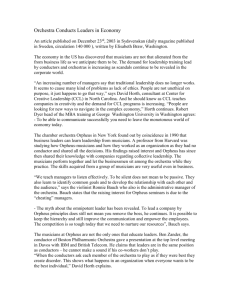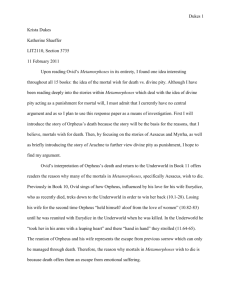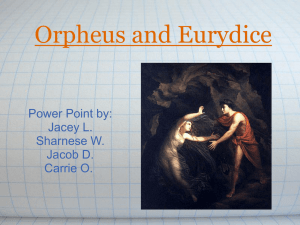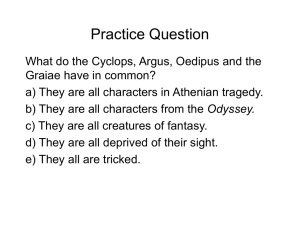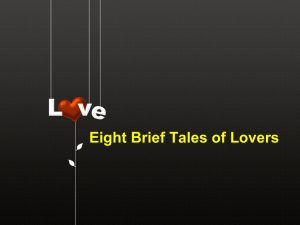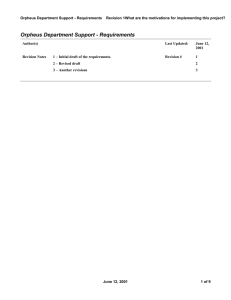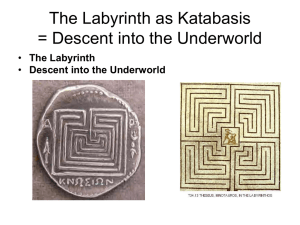The Orphic Myth in the Sixteenth Century
advertisement
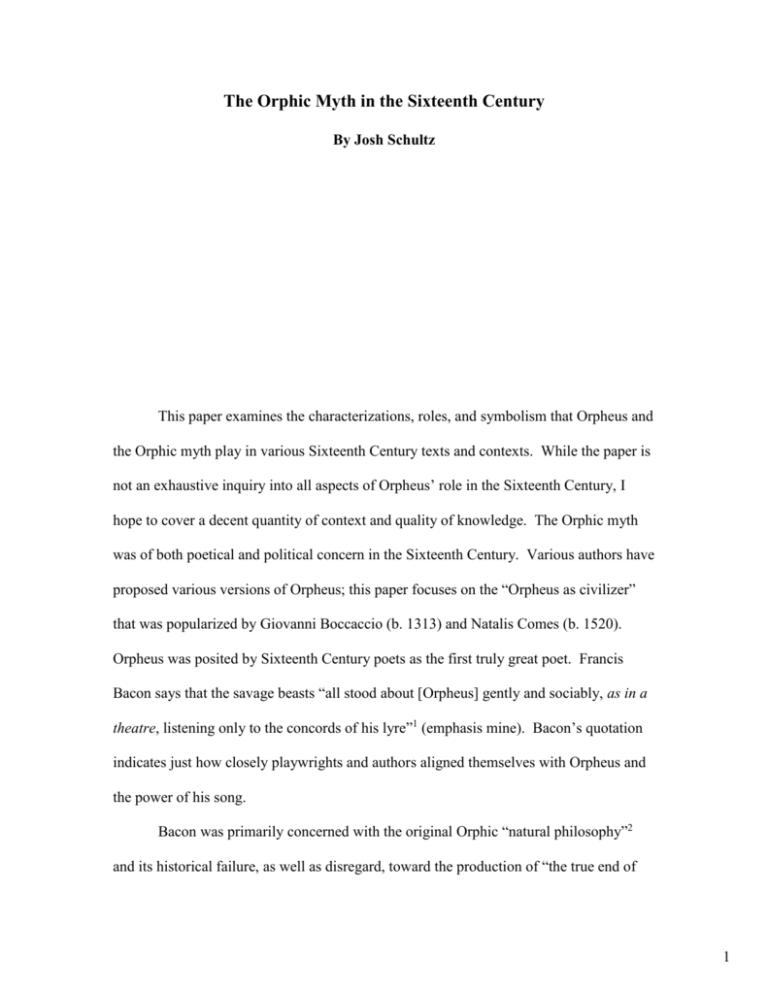
The Orphic Myth in the Sixteenth Century By Josh Schultz This paper examines the characterizations, roles, and symbolism that Orpheus and the Orphic myth play in various Sixteenth Century texts and contexts. While the paper is not an exhaustive inquiry into all aspects of Orpheus’ role in the Sixteenth Century, I hope to cover a decent quantity of context and quality of knowledge. The Orphic myth was of both poetical and political concern in the Sixteenth Century. Various authors have proposed various versions of Orpheus; this paper focuses on the “Orpheus as civilizer” that was popularized by Giovanni Boccaccio (b. 1313) and Natalis Comes (b. 1520). Orpheus was posited by Sixteenth Century poets as the first truly great poet. Francis Bacon says that the savage beasts “all stood about [Orpheus] gently and sociably, as in a theatre, listening only to the concords of his lyre”1 (emphasis mine). Bacon’s quotation indicates just how closely playwrights and authors aligned themselves with Orpheus and the power of his song. Bacon was primarily concerned with the original Orphic “natural philosophy”2 and its historical failure, as well as disregard, toward the production of “the true end of 1 knowledge,”3 i.e., bodily immortality. Bacon sees that the only kind of immortality truly available to men is that of fame. Orpheus, unable to revive Eurydice, turns to charming animals, trees, and stones, which is aligned with the “derivative immortality produced by lasting fame.”4 Ancient Orphic philosophy was unable to resist the Christian claims of the soul’s immortality and the body’s resurrection at the Last Judgment, which left the philosophy vulnerable to distortion, co-option, and eventually obsolescence.5 Bacon associates “philosophy moral and civil,”6 i.e., political order and the production of peace, with Orpheus’ ability to charm nature and more importantly with his ability to make nature forget “all their quarrels and ferocity.”7 Completing the association in his Wisdom of the Ancients: Orpheus; or Philosophy, Bacon says that Orpheus and his political order will be periodically destroyed by “certain Thracian women, under the stimulation and excitement of Bacchus,”8 i.e., unrestrained (religious) passions. The question as to why exactly this vulnerability was made possible is of particular interest though beyond the scope of this paper. It may have been made possible partly, as Bacon suggests, due to natural philosophy’s disregard toward the desire for bodily immortality and partly to what may have been, in my own speculation, the concealment and subsequent loss of visionary sacraments within the Orphic mysteries.9 From the fourth to the sixth century Orpheus had been co-opted by the Christians as a kind of Good-Shepherd-Christ figure. And later he had become co-opted as a Biblical David figure as well. In Milton’s Lycidas we see an Orpheus that clearly no longer serves a function of co-option, but rather one of a distant regard; Milton asks “What could the Muse herself that Orpheus bore”10 have done to prevent Lycidas’ death? He says, “His gory visage down the stream was sent,”11 indicating that even Orpheus, the 2 man whose poetic expression was able to change the nature of reality, could not prevent his own macabre death. Milton sets up Orpheus against a backdrop of doubt – he sees that devoting a life to poetry ultimately results in death and even when fame is within reach Fate cuts it off with its scissors. The reassurance Milton seeks is not to be found in the pagan myths of the past. His movement toward a Christian resolution to the sorrow of Lycidas’ death further reinforces this sense as well. Separated from Christianity, the myth of Orpheus was then able to move toward more politically oriented realms of discourse. Orpheus is invoked as one of the first philosophers by Apologists and their defenses of poetry. In his work The Arte of English Poesie George Puttenham says, And Orpheus assembled the wilde beasts to come in heards to harken to his musicke, and by that meanes made them tame, implying thereby, how by his discreete and wholsome lessons vttered in harmonie and with melodious instruments, he brought the rude and sauage people to a more ciuill and orderly life, nothing, as it seemeth, more preuailing or fit to redresse and edifie the cruell and sturdie courage of man then it.12 In the context of his treatise, Puttenham wants to demonstrate how poetry can be subjected to the rules of political order and that civilization is in fact dependent upon the right, presumably vatic, language. Poetry was then posited as a tool of learning and education; the poets of antiquity were no longer merely poets, but rather priests, prophets, legislators, and politicians. Sir Philip Sidney also invokes Orpheus as a tamer of “stony and beastly people.”13 Allaying Christian fears of paganism, however, he says that Orpheus and many other Greek and Roman mythological figures were “in a full wrong divinity.”14 As the pagan religious context of the Orphic myth was no longer of significance, Orpheus was conveniently able to become a political and judicial entity. Late Sixteenth Century English colonialists returned to the civilizing Orpheus myth as a 3 pillar of support for the Tudor conquest of Ireland. In Musophilus Samuel Daniel invokes the overtones and assumptions of the Orphic power in a very frank and apparent manner as a civilizing and colonialist force. He refers to this power as the “Power above powers”15 and a “Heavenly Eloquence”16 identifying it with the music of the spheres. He says, And who—in time—knows whither we may vent The treasure of our tongue? To what strange shores This gain of our best glory shall be sent To enrich unknowing nations with our stores? What worlds in the yet unformed Occident May come refin’d with the accents that are ours? Or, who can tell for what great work in hand The greatness of our style is now ordain’d? What powers it shall bring in, what spirits command? What thoughts let out ; what humours keep restrain’d? What mischief it may powerfully withstand ; And what fair ends may thereby be attain’d?17 The wild and barbarous Irish and their vulgar bards, as well as the bards of unknown nations, are set as an opposition to the civil, eloquent, and wholesome Elizabethan Orpheus; a barbarous nation’s entire construction of the world is a jumbled and chaotic canvas, which must be “refined” by the Elizabethan accents, dialects, and language.18 The “strange,” and alien, lands and people must be made familiar with the “best glory” the British possess, i.e., the enlightenment of their tongue and more specifically of Christ. The last stanza of Daniel’s poem is highly suggestive of the Orphic power translated into a magisterial role, which is precisely what happened in Ireland. As the last stanza indicates, Orpheus and his power are no longer merely philosophical but magisterial and judicial. That Orphic power would then be used to withstand mischief and attain “fair ends,” or justice. The English magistrate had eventually replaced the Irish bard and he 4 had done so with the instrument of the common law; the “civilizing” Orphic myth greatly helped serve, at least as an intellectual basis, the process of “moving men to virtuous action.”19 We find another example of this inertia of virtuousness in Spenser’s The Faerie Queene. He says that, “The generall end...of all the booke is to fashion a gentleman or noble person in vertuous and gentle discipline.”20 He invokes what is generally considered to be the Muse Calliope when he says, “Helpe then, O holy Virgin chiefe of nine”21 Calliope is of course the mother of Orpheus and can be seen as the source of cosmological mystical knowledge; she is the source of poetic eloquence and through that eloquence Orpheus is able to make men “vertuous.” Several Sixteenth Century poets saw themselves as carrying out, or at least trying to carry out, the Orphic fantasy. As a Muse, Calliope is an appropriate choice for Spenser’s to have made. Orpheus is, however, never explicitly mentioned in Book I. Spenser identifies Orpheus with the Biblical David at the beginning of Book IV. He says, Is wicked discord, whose small sparkes once blowen None but a God or godlike man can slake; Such as was Orpheus, that when strife was growen Amongst those famous ympes of Greece, did take His siluer Harpe in hand, and shortly friends them make. Or such as that celestiall Psalmist was, That when the wicked feend his Lord tormented, With heauenly notes, that did all other pas, The outrage of his furious fit relented.22 The association of Orpheus with David is a natural one and was used by medieval writers. Spenser identifies both Orpheus and David as a “God or godlike man;” we might say that as a poet who wishes to make men virtuous Spenser is also implicitly associating himself with this type of character. As Christ saved man from hell with the word of God 5 so did David banish the demon from Saul and sooth him with his harp; and Orpheus melted the stiff hearts of the gods of the underworld. Spenser directs the inertia of the reader’s attention toward a Christian identification of Orpheus. Later in Book IV, however, Spenser uses Orpheus to show the brutishness and foolishness of Scudamore. Scudamore’s identification with Orpheus in Book IV is ironic as he is unable to win Amoret’s heart or assuage her virgin anxieties with his inarticulate and barbaric, or as he says, “Bold,”23 approach to courtship. He is then like the failed Orpheus; however, unlike Orpheus, Scudamore lacks poetic ability completely. James Brown tells us that, “Scudamour’s failure points out the importance of poetic eloquence to the happy fulfillment of the erotic impulse.”24 Spenser is in one sense underscoring his own potency by using the Orphic myth in this context; Scudamore’s inability to sing of love in a way that appropriately posits the human with the cosmos and the heavens reveals his own impotency as he loses Armoret to Busyrane. Brown says that Spenser creates an “ideal poetic world, and creates ‘fictions’ in which man and monarch’s relations to other people and to the cosmos are delineated in such a way that the cosmic order is revealed and understood to be just.”25 Within this framework we can say that Spenser fulfills the function of an Orphic poet that civilizes his fellow man. Cosmic order was delineated in a way in the Sixteenth Century that was very much rooted in the mythology of Orpheus. In The Merchant of Venice Shakespeare says, There's not the smallest orb which thou behold'st But in his motion like an angel sings, Still quiring to the young-eyed cherubins; Such harmony is in immortal souls; But whilst this muddy vesture of decay Doth grossly close it in, we cannot hear it.26 6 Shakespeare is referring to the Pythagorean and Neoplatonic idea of the “music of the spheres” in this quotation. The idea that the cosmos is united in a song of harmony, ordering all natural and human aspects of the universe, was central to the Elizabethan world-view. The song is one that is attributed to the medieval Orpheus by Fulgentius; Orpheus was privy to the knowledge of the music of the seven spheres during his search for Eurydice among the planets.27 While the relationship between Lorenzo and Jessica is likely of doubtful strength, the union of holy marriage, specifically a Christian marriage, can be seen as an expression of this cosmic harmony. The quotation has similarities with Spenser’s description of Red Crosse’s union with Una, which also describes in detail the “heauenly noise”28 and the “Angels voice.”29 Their marriage also represents a harmonious union of both cosmic and sexually dichotomous forces. Red Crosse has overcome the “vegetative”30 state of lust and sin that Archimago envelops; interestingly, Shakespeare aligns the vegetation and muddy “decay” of the grassy bank with the cessation of the music of the spheres. The bank lacks the transparency of the spheres; the lyre of Orpheus, with its seven strings corresponding to the seven spheres, was as John Friedman says, “an enemy of the lower realms of earth and water, where humidity would cause its strings to lose their tension, just as material concerns would weight the soul and impede its journey to the One.”31 Although Lorenzo’s quotation starts out as an explication of the natural order it turns into a warning about the political order. He says, By the sweet power of music: therefore the poet Did feign that Orpheus drew trees, stones and floods; Since nought so stockish, hard and full of rage, But music for the time doth change his nature. The man that hath no music in himself, Nor is not moved with concord of sweet sounds, Is fit for treasons, stratagems and spoils; The motions of his spirit are dull as night 7 And his affections dark as Erebus: Let no such man be trusted. Mark the music.32 Lorenzo’s words mirror the sentiment in the fourth century (306 A.D.) apocryphal Gospel of Nicodemus, where Death says to God, “As for wise that are able to charm wild beasts, their charms enter not into my ears.”33 If the music of Orpheus, or the verse of Elizabethan poets, is unable to move a man then he is no longer merely a beast anymore, but rather an embodiment of death itself. Shylock is just such a man; Cardinals Wolsey and Campeius, as well as King Henry VIII, also fit Shakespeare’s description of men who are fit for stratagems and lack, or resist, an essential compassion. Archimago, from The Faerie Queene, can also be included in this list. Although the poet is aligned with Orpheus in Lorenzo’s invocation of the myth, Shakespeare makes it clear that real – i.e., political – power is asserted not through musical or poetic creativity, but rather through betrayal, violence, and plots. Music and poetry change our nature “for the time” in which we experience them, i.e., a temporary time. A certain degree of ineffectuality with regard to poetry and music is implied in Lorenzo’s words. We also see this sense of ineffectuality in other texts as well. In King Henry VIII, John Fletcher invokes Orpheus prior to Katherine’s death, during her sadness, when the Cardinals come to offer the King’s “support” to her, subsequent to the annulment of their marriage; the music can be seen as symbolic of the escape she seeks from her intolerable situation. After waking up from a glimpse of the “celestial harmony” in her dream-vision state Katherine says to, “bid the music leave” as it is “harsh” and “heavy.”34 The invocation of the imitative-Orphic music is ineffectual and only moves Katherine to sadness after she hears and sees the celestial harmony that awaits her. Similarly in the Old Arcadia, Sidney tells us of Orpheus’ ability to charm 8 nature, yet the speaker is unable to attract the attention of his beloved. Maria Prendergast tells us, “Such examples suggest that the Orpheus myth, as it is articulated in the Sixteenth Century, symbolically embodies a collective fantasy that the poet can dominate his culture with magisterial rhetoric, while covertly acknowledging that such power is, ultimately, ephemeral.”35 The figure of Orpheus alone seems to be a tenuous archetype for the poet; central to the Orpheus myth is the reflexive backward look toward the creation of his art, and the subsequent tragedy of the loss of the vision. Fifteenth and Sixteenth Century apologists of poetry tried to mitigate the tension between their own ideas and the ideas of the theological-philosophers and puritans by invoking, as well as trumpeting the import of, the Orphic myth. The “Orpheus as civilizer” generally acted as the primary version of their invocation. These poets also had a subtext of self-interest in mind when it came to perpetuating the Orphic myth; the myth implies that the wise politician should “respect the ‘godlike’ poet, acknowledge him as superior, and attempt to understand and benefit by his poetic vision.”36 Of course this is not to brazenly equate the art of Sixteenth Century poets with the machinations of politicians; for skeptics, the continued existence and credibility of the poets’ art may have partly required an intermediary plea in the form of the Orphic myth. Orpheus provides a unique window into various Sixteenth Century texts; as an additional avenue of interest, and in relation to the Orphic myth, one might also investigate the historical changes in language and symbolism surrounding the Eucharist. 9 Works Cited: 1 Spedding, James, Robert L. Ellis, Douglas D. Heath, eds. The Works of Francis Bacon: Baron of Verulam, Viscount St. Alban, and Lord High Chancellor of England. 14 Vols. 1870. New York: Garrett Press, 1968. Wisdom of the Ancients, XI. Orpheus; or Philosophy. VI, 720-2 2 The Works of Francis Bacon, op cit. 3 Bacon, Francis. Valerius Terminus: On the Interpretation of Nature. See Ch. 11, Ch. 1: “all operations and possibilities of operations from immortality (if it were possible) to the meanest mechanical practice.” <http://etext.library.adelaide.edu.au/b/bacon/francis/valerius/> 4 Paterson, Timothy H. Bacon’s Myth of Orpheus: Power as a Goal of Science in ‘Of the Wisdom of the Ancients.’ Interpretation. Spring 1989, Vol. 16. No 3. 5 Bacon’s Myth of Orpheus: Power as a Goal of Science in ‘Of the Wisdom of the Ancients.’, op cit. 6 The Works of Francis Bacon, op cit. 7 The Works of Francis Bacon, op cit. 8 The Works of Francis Bacon, op cit. 9 Hoffman, Michael. The Eucharist Was Visionary Plants. 1985-2004. <http://www.egodeath.com/eucharistwasvisionaryplants.htm> 10 Milton, John. Lycidas. Abrams, M.H. ed. The Norton Anthology of English Literature. Vol. 1. New York: Norton, 2000. 11 Lycidas, op cit. 12 Puttenham, George. The Arte of English Poesie: 1589. Menston: Scolar Press, 1968. 13 Sidney, Sir Philip. The Defense of Poesy. Abrams, M.H. ed. The Norton Anthology of English Literature. Vol. 1. New York: Norton, 2000. 14 The Defense of Poesy, op cit. 15 Daniel, Samuel. Musophilus: Containing A General Defence Of All Learning. <http://eir.library.utoronto.ca/rpo/display/poem621.html> 16 Musophilus, op cit. 17 Musophilus, op cit. 18 Gardiner, David. ‘Oh, HowUnlike Unto Orpheus’: The Poetics of Colonization. Renaissance forum. Vol. 4, No. 2, 2000 19 ‘Oh, HowUnlike Unto Orpheus’: The Poetics of Colonization, op cit. 20 Spenser, Edmund. The Faerie Queene. 1596 ed. <http://darkwing.uoregon.edu/~rbear/fqintro.html> 21 The Faerie Queene, op cit. Intro. 22 The Faerie Queene, op cit. Book IV. Canto II. 23 The Faerie Queene, op cit. Book IV. Canto X. 24 Brown, James. This Bryttane Orpheus: The Orpheus Myth in the Poetry of Edmund Spenser. Diss. University of Saskatchewan. 1973. (p. 216) 25 This Bryttane Orpheus, op cit. (p. 75) 26 Shakespeare, William. The Merchant of Venice. V.i. 27 Friedman, John. Orpheus in the Middle Ages. Harvard University Press: Cambridge, Massachusetts, 1970. 28 The Faerie Queene, op cit. Book I. Canto XII. 29 The Faerie Queene, op cit. Book I. Canto XII. 30 The Faerie Queene, op cit. Book I. Canto VIII. “Decayd, and all his flesh shronk vp like withered flowres.” 31 Orpheus in the Middle Ages, op cit. (p. 81) 32 The Merchant of Venice, op cit. V.i. 33 Orpheus in the Middle Ages, op cit. (p. 53) 34 Shakespeare, William. Fletcher, John. King Henry VIII. IV.ii 35 Prendergast, Maria Teresa Micaela. The Unauthorized Orpheus of 'Astrophil and Stella.' Studies in English Literature, 1500-1900. 1995, Vol. 35. No 1. 36 This Bryttane Orpheus, op cit. (p. 208) 10

